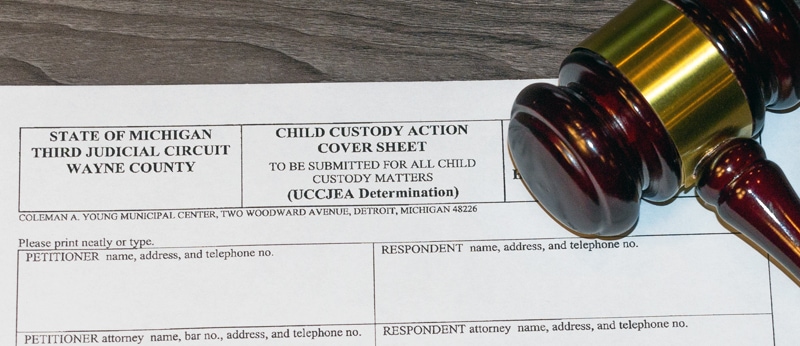
Partner, Divorce Lawyer
Michigan Child Custody Lawyer
Child custody has been an evolving legal matter over the last century, particularly, in the State of Michigan. For instance, the father used to have absolute property rights to the children. Afterwards, the law shifted, and generally considered the mother as the preferred parent. In the modern day, Michigan’s standard of child custody is “best interest of the child.” In other words, one parent cannot receive biological preference as the sole determining factor of custody.
As experienced child custody lawyers in Michigan, Kelly & Kelly P.C. understands legal factors involved in determining “the best interest of the child” and other processes involved in Michigan family/divorce court.
If you have concerns involving child custody or divorce, call our experienced Michigan family law firm today.
Child Custody Attorney Ryan Kelly in The Media
How We Can Help
The family law attorneys of Kelly & Kelly P.C have represented clients throughout Michigan for over 30 years. Our law firm has experience in all courts throughout the State and understands the complexities of the legal system. When you hire our firm, you get an entire team of experienced and passionate attorneys working on your case. If you’re looking for a child custody lawyer, Kelly & Kelly P.C is a strong ally for these cases.
Michigan Child Custody Laws
This section provides a general overview of Michigan child custody laws. For a more in-depth description and analysis of these laws, you can refer to our comprehensive article on Michigan custody laws.
Michigan child custody laws focus on the child’s best interests, considering factors like emotional ties, each parent’s stability, and the child’s adjustment to home, school, and community.
The laws allow for joint or sole custody, encompassing both physical (where the child lives) and legal custody (decision-making authority for the child).
Courts encourage parenting plans that involve both parents in the child’s life, but the final custody arrangement is determined based on what will best serve the child’s needs and welfare.
The two main types of child custody are: physical and legal.
- Physical custody refers to where a child lives. In other words, which parent does the child live with and for what percentage of time does the youngster stay with that parent. Mom and Dad may share physical custody; 50/50, 70/30, or 80/20. The 80/20 schedule is usually a sole physical custody arrangement where the child lives with one parent and visits the other one.
- Legal custody determines who makes various decisions in the child’s life. The decisions may include health care, education, religion, and others. Usually, there is a joint legal custody agreement in place. In a joint arrangement both parents are involved in determining what’s best for the young person. However, if one person has sole legal custody, that person makes all legal decisions for the child. This may happen if one or both parents are unable to raise a child for any reason.
Child Custody Lawyer Legal Services
Our child custody lawyers offer a range of services tailored to resolve custody issues and ensure the child’s best interests are protected. These services include but are not limited to the following,
Child Custody Arrangements: Advising on and drafting agreements for physical and legal custody.
Parenting Time (Visitation): Creating schedules and plans for non-custodial parent visitation.
Child Support: Calculating, negotiating, and enforcing child support payments.
Modification of Custody Orders: Assisting in the modification of existing custody orders due to changes in circumstances.
Paternity Establishment: Legal support in establishing paternity for custody and support matters.
Relocation Disputes: Representing parents in cases where one parent wishes to move with the child.
Guardianship: Establishing guardianship arrangements in cases where parents are unable to care for their child.
Enforcement of Court Orders: Ensuring that existing custody and visitation orders are followed.
Mediation and Arbitration: Offering alternative dispute resolution methods to settle custody issues outside of court.
Advocacy in Court: Representing parents in custody hearings and litigation.
Parenting Time
In Michigan, there is a presumption that it is in the best interest of the child to have a strong relationship with both parents. If one parent has sole physical custody of a child in Michigan it is presumed that the other parent will be granted parenting time, which means spending time with the child. This might mean certain weekends, holidays, certain extended vacations. Courts and parties can get creative in determining parenting time in Michigan.
Parties are free to come to an agreement on their own about parenting time in Michigan cases, which are subject to the court’s review of the “best interest of the child” or a court may determine the parenting time.
Parenting time is modifiable in Michigan by the parties consent or a party filing a motion, and the court making a determination if proper cause has been shown and if there is a change of circumstances, which warrant the modification.
Temporary Order Of Custody
During a family court proceeding such a divorce in Michigan the court may grant a temporary order of custody. This is not the final judgment, but may become a final judgment if the Michigan family court should order the child to remain in the same custodial environment.
One important facet of the temporary order is that it could lead to a custodial environment being established, which would apply the higher standard for the other parent changing the child’s custody situation in Michigan.

Michigan Sole Custody vs Joint Custody
In Michigan sole custody means that one parent has primary physical custody as well as legal custody of the child. Joint custody in Michigan means that parents could share one or both of physical and legal custody.
Legal custody of a child in Michigan is defined as a parent having the responsibility over major decisions regarding the child’s upbringing, medical treatment, school enrollment, religious instruction and other similar matters.
Decisions are to be made with the parent who has physical custody of the child at the time that the decision is made. This means that the parent without legal custody of a child, may make certain decisions for the child while spending their parenting time.
Child Custody Lawyer FAQ
Legal Areas Related To Child Custody
Talk To a Child Custody Lawyer
With extensive experience in Michigan’s family law courts, our child custody attorneys bring a wealth of knowledge to every case, particularly those intertwined with divorce proceedings. Our collaborative approach means you benefit from a team of seasoned lawyers dedicated to your family’s well-being.
If you or someone you know are navigating the complexities of child custody or divorce, we invite you to schedule a confidential consultation to explore how we can support you during this pivotal time.
This page was legally reviewed by Ryan Kelly. Ryan has been a practicing family law and divorce lawyer for over a decade. Throughout this time she’s represented clients through various complex issues involving the family court system. This includes divorces, child custody, contested divorces, alimony, and more. She previously served as President for both the WLAM and the Women’s Bar Association and is recognized among the top 10 lawyers under 40 by the National Academy of Family Law Attorneys. She also contributes regularly to the Institute of Continuing Legal Education (ICLE) as a speaker on issues involving family law and child support.




